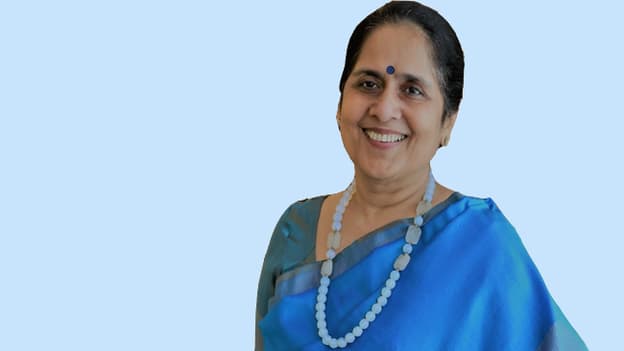We have a level playing field for marginalized groups today: TCS' Dr. Ritu Anand

Dr. Ritu Anand is a pioneer in the field of Human Resources with a career spanning 25+ years. She is a Senior Vice President at Tata Consultancy Services and spearheads TCS' Workplace Diversity initiative and is a member of the Group Diversity Council and the HR Steering Committee at the Tata Group. Her various advisory roles include: Member of Worldwide ERC Global Advisory Council and Advisory Board member of the National HRD Network in Mumbai. She is the Governing Board Member of WILL (Forum for Women in Leadership), which aims at bringing together the collective aspirations, talents, and mentoring of women across corporate India. She is on the Board of Directors at two Tata Group companies and has a doctorate in Psychology.
Here are the excerpts from an interview with People Matters.
How do you see the work dynamics change in the coming days as we come out of this crisis?
I see a lot of positives for businesses across industries in the long term; for some industries, the positive changes are right here and right now. Till 2020, people practices, and policies governed the workplace culture- all that changed in 2020. In the coming years, I foresee a lot more power in the hands of employees. While every company may not be a technology company, every organization is a people’s organization. Organizations will see a shift in the work dynamic, with people having the flexibility and opportunity to guide job content, the way they work, and the work they do. Progressive companies that invest in the right infrastructure will enable individuals and teams to succeed against constantly shifting realities.
COVID-19 has exposed several gaps and inequalities. What are some bold steps that organizations and governments should take to fill the gaps and create a fairer society?
Equality and equity balance has been skewed for years and decades. COVID-19 has exposed it and brought it to the front stage. The companies which will continue to focus on equality are going to remain behind in the race of equity. We need to create equitable workplaces. Institutions need to understand the differences which make us the unique individuals we are. When this diversity is understood, it will enhance the race to make this society an equitable place to live and work.
Also Read...
- The pandemic has exposed inequities like never before: Bain's Diversity Head
- When leaders Choose To Challenge: International Women's Day 2021
- Interview with AXA Group’s Global CHRO
- 10 Global leaders on what they learned from the pandemic
From the perspective of governments and organizations, several measures can be taken to change. From partnering to identify underserved sections of society, access to demographic data, that can inform skilling and reskilling programs to build workforces of today and for jobs of the future. Public-private sector partnerships have the power today to foster greater economic growth, equity, and parity across multicultural, multi-generational diverse workforces.
The crisis has exposed how some companies view diversity, equity, and inclusion. How do you see the current scenario globally?
Companies reeling under financial pressures adopted several short-term measures to fight the crisis, including shedding jobs across departments. Various incidents throughout the last 12 months also revealed the cracks in our societal and corporate outlook on diversity. But it also created opportunities for active dialogue, for individuals and diverse segments of society, to get involved and have a voice, and for leaders across the public and private sectors to recognize the need for these conversations, actively acknowledge biases, review processes, and policies, form partnerships to commit to and drive change, and accelerate the implementation of programs to counter systemic inequality. The admittance of uncomfortable truths is often the first step towards change and 2020 certainly was the year that saw this on multiple fronts.
Some of the leaders whose approach to the pandemic has been extraordinary are women. For the post-pandemic world, do you think, we need leadership that recognizes the potential of diverse talent and understands its implications on inclusion and culture?
The need for diverse leadership was relevant even in the pre-pandemic world. We saw a lot of women leaders, in companies and the government sector, respond with agility and empathy to the needs of people. Having said that, it would be incorrect to segment responses as those by “women” – these were responses and strategies by phenomenal leaders, several of whom were women. The pandemic has been a great equalizer. None of the previously established “rules of success” worked in this situation. Oftentimes, the best responses were an outcome of collaboration and innovation, driven by diverse teams and progressive enterprises. Certainly, these have further strengthened the argument in favor of diversity across leadership segments both in the public and private sector space. The sooner we blur the segmentation of the leadership lens, the better it would be.
Remote work, beyond being effective, has opened up opportunities to fill gaps. How do you see the larger opportunity and how leaders harness this to their advantage?
In the last 12 months, the definitions of workspace, work, and workforce have changed significantly. The opportunities that remote work has opened up are limitless. From an organizational point of view, with the use of connectivity, technology, and collaboration tools, companies now have access to a multicultural, multigenerational global talent cloud, no longer constrained by physical location. The same goes for individuals. All of a sudden we have a level playing field for marginalized groups. People who were constrained – primary caregivers, differently-abled, older generations - can opt in to work. If we continue on the momentum we gained during this time, the impact will be far-reaching in driving innovation, enabling economic growth and parity, and empowering underserved segments of society with new opportunities.
There are ample studies that demonstrate a strong correlation between diversity at a leadership level and business results. But not much is changing in the real world. Why are we failing?
I am a firm believer in the fact that what gets measured gets done. Often Diversity and inclusion strategies and performance goals are relegated to the realm of HR and not closely interlocked with business priorities. That is a fundamental change that needs to be driven across institutions. Business leaders, mentors, and individuals within the organization need to be enabled and empowered with an understanding of diversity objectives, visibility into areas of contribution, access to the relevant data, allies, and networks, and accountability for diversity outcomes so they can contribute to and collaborate to build an inclusive enterprise.
How can organizations embed diversity and inclusion in their business strategy?
The crisis proved that collaborative, innovative, and inclusive enterprises will be ones that can build resilience and drive sustainable growth. From talent management – recruitment, compensation, and benefits, mobility, transparency in opportunities- to diversity linked business performance goals to partnerships within the business ecosystem with organizations to support, collaborate and enable the building of diverse teams and inclusive culture, DE&I needs to be embedded across the board and the business.
What initiatives has TCS taken to build a diverse and inclusive workforce culture? Are they paying off? How do you measure the impact?
First, we debated and defined our success measures and then embarked on the journey of diversity, equity, and inclusion @TCS – gradually but with a vision to be sustainable forever. We believe in bringing the inclusion mindset into our workstyles rather than setting diversity targets. We ran campaigns to create awareness, shared metrics, inspired leaders to be champions of equity, be allies of diversity, showcased diverse role models, had courageous and meaningful conversations, focused on the diversity of the mind and development of leaders. The impact will be seen when the core organizational metrics show a positive trend.
Read more such stories from the February 2021 issue of our e-magazine on 'The Moment to Fix the DE&I Equation'














